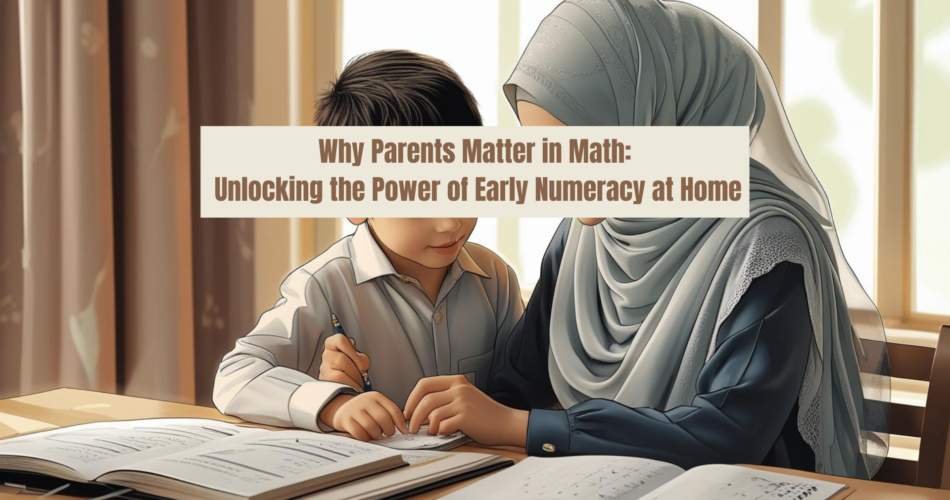Mathematics isn’t just for the classroom—it begins at home, often long before a child sets foot in school. The early years are a critical period when a child’s foundation in mathematics is formed, and what happens at home can significantly influence future success. Parents play a powerful role in building this foundation, yet research shows many still undervalue early numeracy compared to literacy. This article explores why parental involvement in mathematics education is essential and what schools, educators, and families can do to support young learners.
Understanding the Home Numeracy Environment
Parental involvement in mathematics, often referred to as the home numeracy environment (HNE), includes any numeracy-related activities parents engage in with their children. This might include counting objects during play, measuring ingredients during cooking, or recognizing numbers during a walk.
A recent study by Napoli, Korucu, Lin, Schmitt, and Purpura (2023) revealed that while parents often engage in literacy activities, they engage far less in mathematics activities. This disparity highlights a major gap in the way we prepare children for future academic achievement.
Why Early Mathematics Exposure Matters
Mathematics learning in the early years is a strong predictor of later school success—not just in math, but across subjects. However, the study found that:
- Parents tend to focus more on literacy than mathematics.
- Many parents do not believe young children are ready for numeracy tasks.
- Parents often lack awareness of how simple, everyday math interactions contribute to learning.
Research has consistently shown that early numeracy skills predict later academic achievement, sometimes even more strongly than early literacy skills. Yet public messaging and parental beliefs still lag behind.
Key Factors Influencing Parental Involvement in Mathematics
1. Child’s Age
Older preschoolers receive more frequent mathematics interactions than younger ones. Parents often believe younger children aren’t ready for math activities, despite the fact that even toddlers benefit from basic number play.
2. Child’s Sex
Although previous studies have highlighted gender biases in mathematics, this study found no significant difference in how often boys and girls were engaged in numeracy activities. However, the overall frequency of these activities was low.
3. Parental Education
Parents with higher levels of education tend to provide richer mathematics learning experiences at home. Those with lower educational attainment may face time constraints, undervalue their role, or lack access to resources and ideas.
4. Number of Children in the Home
Interestingly, the number of children in a household did not significantly affect the frequency of mathematics activities. In some cases, siblings may even enhance these learning opportunities through shared activities.
5. Parental Beliefs
Parents who believed in the importance of mathematics were more likely to engage their children in numeracy activities. However, many parents still view literacy as more essential, leading to an imbalance in home learning opportunities.
Bridging the Gap: What Can Be Done?
For Parents:
- Start early: Even toddlers can engage in simple counting or sorting games.
- Use everyday opportunities: Grocery shopping, cooking, and playtime all present natural chances to incorporate mathematics.
- Seek support: Don’t be afraid to ask educators or use online resources to learn easy ways to teach math at home.
For Educators:
- Educate parents: Share research and practical tips on how parents can support mathematics learning at home.
- Integrate home-school links: Send home math-based games or challenges that involve family participation.
- Respect diversity: Recognize and support families who may have limited time or resources.
For Institutions:
- Public campaigns: Promote the importance of early mathematics the same way literacy is promoted.
- Parental workshops: Offer regular training or community sessions on supporting children’s learning at home.
- Research-driven policy: Invest in programs and interventions that encourage balanced literacy and numeracy development.
Conclusion
This article highlights a crucial, often overlooked aspect of education: the impact of parental involvement in early mathematics development. Drawing from recent research, we explored the key child and parent factors that influence the frequency of numeracy activities at home. While parents tend to prioritize literacy, the evidence shows that mathematics development is just as vital, especially in the preschool years. Parental education level, beliefs, and child age all shape the home numeracy environment. To close the gap, educators, institutions, and families must collaborate to raise awareness, offer support, and prioritize early mathematics education.
If you want a clear understanding of how parents influence early mathematics learning, why it’s important, and what can be done to improve it, this article offers a comprehensive guide based on research and actionable insights. Let’s give mathematics the attention it deserves—starting from home.
Click here to buy a worksheet bundle made for 1st graders to practice numbers. These worksheets are as easy as parents can guide the child at home.
